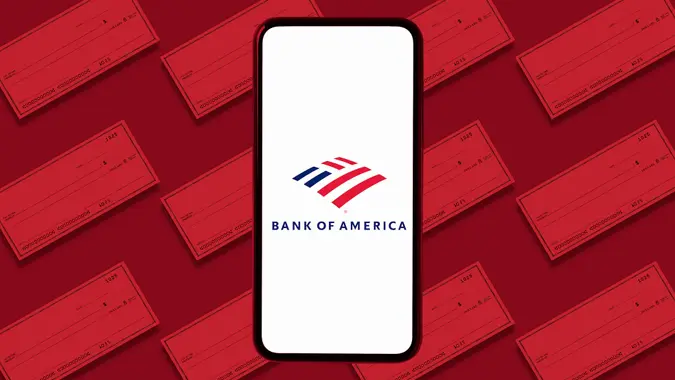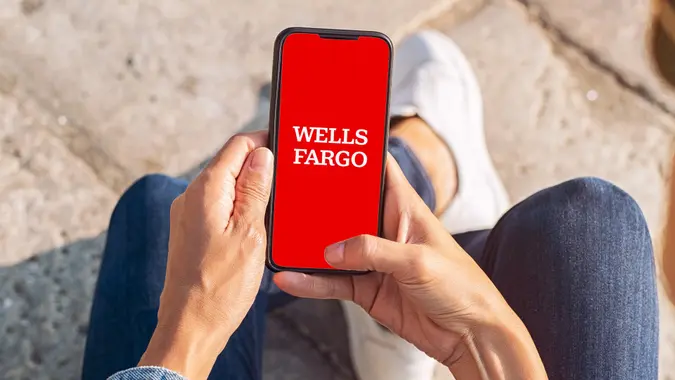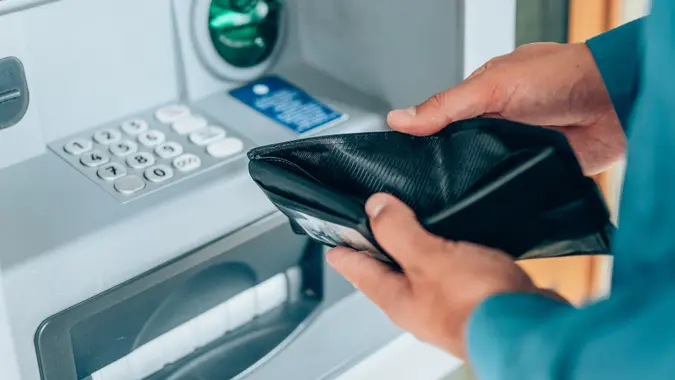Experts: Here’s How Much You Should Have in Your Checking Account

Commitment to Our Readers
GOBankingRates' editorial team is committed to bringing you unbiased reviews and information. We use data-driven methodologies to evaluate financial products and services - our reviews and ratings are not influenced by advertisers. You can read more about our editorial guidelines and our products and services review methodology.

20 Years
Helping You Live Richer

Reviewed
by Experts

Trusted by
Millions of Readers
Checking accounts are the bedrock of personal finance in the United States.
According to a recent GOBankingRates survey of over 1,000 adults from all over the country, more than 98% of Americans have a checking account, the highest percentage among all account types. However, 38% of those surveyed say they barely keep any money in checking at all.
GOBankingRates talked to experts who weren’t very surprised at the findings. Here’s what money professionals think is the appropriate amount of cash to keep liquid and at the ready in a checking account.
A Hundred Bucks? Not So Surprising
The study found that 38% of the country — more than 1 in 3 Americans — keep a balance of $100 or less in their checking accounts at any given time.
Next, 22% of respondents keep a balance of $101-$500 in their checking account, while 14% keep a $501-$1,000 balance. Only 9% of people maintain a balance of $1,001-$1,500, and just 5% keep a larger balance of $1,501-$2,000. The final 12% keep a healthy balance of over $2,000 in their checking account.
True Tamplin, founder of Finance Strategists, said that 38% of respondents keeping $100 or less in checking at any given time does not necessarily surprise him.
“Some individuals might use their checking account primarily for day-to-day transactions, keeping a minimal amount to avoid overspending or to maintain simplicity,” Tamplin said.
“With living expenses steadily climbing, many families are living paycheck to paycheck, leaving little wiggle room for savings,” he added. “Some folks prioritize emergency funds over keeping a bigger checking account balance. Having even a small buffer can provide peace of mind in case of unexpected bills.
“Some people might use other accounts, like high-yield savings or cash management accounts, for the bulk of their money, keeping just enough in checking for daily expenses.”
How Much Should You Keep in Your Checking Account?
The minimum amount you should keep in your checking account depends on who you talk to.
Eric Johns, CFP, MBA and owner of Equilibrium Financial Planning LLC, a fee-only financial planning firm in Louisiana, said, “We advocate clients keep at least one month of expenses in a checking account. Alternatively, some prefer to keep the amount that they would need to write a check for with less than 24 hours of notice. This typically includes house repair expenses like plumbing, HVAC repair, contractor labor and appliance repair.”
Eric Croak, CFP and the president of Croak Capital, a wealth management firm in Toledo, Ohio, recommends a slightly different approach.
“The general rule of thumb for checking accounts is to have enough in checking for one or two months of expenses, plus a 30% buffer,” he said. “This extra 30% helps if you spend more than planned in a month.”
Pros of Having $100 or Less in Your Checking Account
So what are the advantages of having $100 or less in your checking account?
“The benefit to maintaining a low balance is that you are not allowing the bank essentially interest-free use of your cash,” said Johns.
But that’s not the only reason keeping such a low amount in your checking account can be a good idea.
“The good part of this is it’s safer from fraud,” said Croak. “If someone hacks your account or steals your debit card, you’re less at risk if there’s not much money in there.”
Cons of Having $100 or Less in Your Checking Account
Having such a low amount in your checking account makes it harder to avoid bank fees.
“It’s smart to always have a minimum amount in checking to dodge bank fees,” Croak said. “The less you pay in fees, the more you keep. Some banks waive monthly fees if you keep a certain balance.”
Unfortunately, $100 might not be enough to meet minimums for avoiding monthly fees. For example, Wells Fargo’s Everyday Checking account requires a minimum daily balance of $500 — or $500 or more in qualifying direct deposits each month — to avoid the $10 monthly service fee.
Croak also pointed out that if you let your checking account balance fall too low, you increase the risk of incurring overdraft fees if your transactions exceed your balance. “Some banks may even charge multiple overdraft fees per day,” he said.
The Right Amount Is… There Is No One Right Amount
A consensus is elusive, of course, because everyone’s life and financial footprint are unique.
“How much you should keep in your checking account depends on various factors, such as your income and expected expenses, recurring bill payments and cash withdrawals,” said Laura Adams, MBA and personal finance expert with Finder.
Another reason that the “right amount” is so hard to nail down has to do with the transitory nature of money held in checking accounts. Checking accounts are a temporary way station for money that will be redirected to pay credit card bills, fund investment accounts and IRAs, and settle up for the month with the mortgage lender.
“Most people deposit income into their checking and make disbursements from that central account for everyday expenses and savings,” Adams said.
One school of thought says that the right amount is whatever you need to cover your expenses — and not much else. Whatever’s left over, after all, could be put to better use elsewhere.
“Since interest earnings on bank accounts are typically a fraction of 1%, keeping large sums in a checking account isn’t a wise option,” Adams said. “Moving excess money into higher-yield savings allows you to earn more interest and maintain a separate fund for emergencies.”
There’s even an argument to be made for putting that money in an index fund, since savings yields aren’t much better than checking yields, but if you are a checking account minimalist, remember that it’s better to have a little too much money than not enough.
Regulation D: Use Savings as a Failsafe — But Only Sparingly
It’s likely that part of the reason people keep so little money in their checking accounts today is that low balances aren’t as dangerous as they once were.
Most banks let you transfer money instantly from savings to checking if things get tight — even after hours — or you can set up overdraft protection that moves money automatically from savings to checking to cover a debt in progress. Those are incredibly helpful tools that would have seemed like magic a generation ago to anyone who ever wrote a check that they didn’t realize they couldn’t cover.
But unlike checking accounts, the money you put in savings was not designed to be transitory. That money is supposed to stay put, and if you overuse your savings account as a backstop to your checking account, you’ll start incurring penalties. That’s because Federal Reserve Board Regulation D forbids you from making more than six withdrawals from a savings account per month.
The Nature of Banking Is Changing
Technology has forced a generational divide in banking habits and attitudes. In a world of crypto wallets and Venmo, paper checks — and the accounts they’re linked to — have taken on a very 20th-century feel.
Many young people have never written a check and have certainly never used longhand arithmetic to balance a checkbook, which is by now the financial equivalent of cursive. In fact, the same survey mentioned above found that 46% of Americans of all ages haven’t written a physical check within the last year.
Older people tend to favor the security of having plenty of cash “on hand” in their checking accounts, while younger generations tend to view all their money as being on hand all the time. With 24/7 access to PayPal, P2P payments, buy now, pay later purchasing options and nearly instant transfers from brokerages to banks, why should they fret about the balance in their checking accounts?
“In the height of the information age, people are getting smarter about personal financial wellness,” said James Dunavant, MBA. “Naturally, their preferences are also shifting toward more transparent platforms that offer faster, simpler and more personalized services. Rather than keeping their money in a checking account, consumers are exploring other options that provide greater benefits, whether it’s increased convenience, speedier processing, more rewards or fewer hidden fees.
“The next generation, in particular, has a deeper understanding of the wide breadth of financial tools that are available to them, and they’re willing to do the extra research to move their money into the best money management services, platforms and apps that make sense for their individual needs and goals.”
Andrew Lisa contributed to the reporting for this article.
Methodology: GOBankingRates surveyed 1,063 Americans aged 18 and older from across the country between Nov. 27 and Nov. 29, 2023, asking twenty-two different questions: (1) What category best describes your current financial institution?; (2) Have you considered changing Banks within the past year?; (3) If you have considered changing banks in the past year, were any of the following factors? (select all that apply); (4) Which feature, perk, or other offering is most important to you when opening an account with a new institution?; (5) Are you currently satisfied with all your banking products and services offered by your Bank/Credit Union?; (6) Would you ever have different types of accounts across multiple banks? (i.e. Checking at Chase, but Savings at TD Bank); (7) What is your most preferred method of banking?; (8) Which of the following is the biggest factor of you staying with your current bank?; (9) Which of the following bank accounts do you currently use/have open? (Select all that apply); (10) How much is the minimum balance you keep in your Checking Account?; (11) How much do you currently have in your Savings Account?; (12) What amount of a sign up bonus would make you consider switching banks?; (13) Have you considered using any app-only banking platforms (aka neobanks) in the past year (e.g. Current, Chime, Dave, etc.); (14) How important is it to you for your bank to be affiliated with a crypto exchange/platform?; (15) In the past year how often have you written a physical check?; (16) When was the last time you visited your bank in-person?; (17) Why would you choose to visit your bank in-person? (Select all that apply); (18) Have you had an overdraft on your checking account in the past year?; (19) How much do you trust your current bank to act in your best interest?; (20) How much do you trust your current bank to protect your private information?; (21) Do you trust regional banks more than national banks?; and (22) How much cash do you keep at home?. GOBankingRates used PureSpectrum’s survey platform to conduct the poll.
More From GOBankingRates
 Written by
Written by  Edited by
Edited by 


























